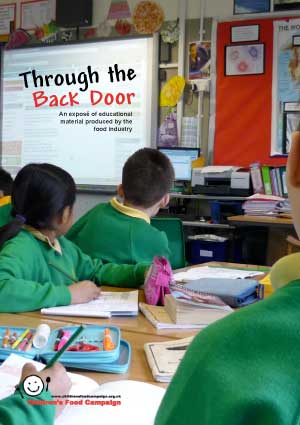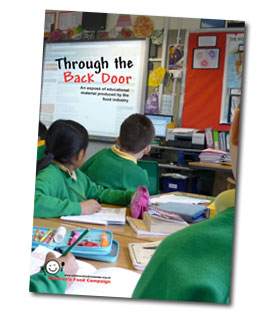
Through the Back Door: An exposé of educational material produced by the food industry
27pp - 2008 | 750Kb

Through the Back Door: An exposé of educational material produced by the food industry
27pp - 2008 | 750Kb
 For many years parents and a range of public health groups have warned that children are being heavily targeted with marketing for junk food on, for example, TV, the internet and on posters near schools. However, largely hidden from parents, many companies have been developing materials for schools that are cleverly designed to promote their products in schools.
For many years parents and a range of public health groups have warned that children are being heavily targeted with marketing for junk food on, for example, TV, the internet and on posters near schools. However, largely hidden from parents, many companies have been developing materials for schools that are cleverly designed to promote their products in schools.
These ‘teaching packs’ are usually available to download from company websites, although some packs are sent directly to schools. They are supposed to provide schools and children with factual and impartial ways of understanding the world around them. But this research by the Children’s Food Campaign has found a series of highly concerning features with this material.
Children as young as five are being taught in school that cheese is a ‘nutritional goldmine”, that crisps are healthier than apples and that refilling empty drinks bottles with tap water is unsafe, according to a report released today by the Children’s Food Campaign.
The exposé, called ‘Through the back door’, has found that food companies are increasingly cooking up their own lesson plans to promote products to children. It finds that many of the curriculum packs produced by companies contain misleading or incorrect information. The Children’s Food Campaign came across packs teaching children that they should include fatty or sugary food as part of their breakfast; that overweight children should not eat less food; and that soft drinks are made with “gooditives”, an invented term to put a positive spin on artificial additives.
Meanwhile, the advertising companies responsible for producing these materials boast of offering companies a “captive audience of some 7.5 million young people, their teachers, school managers, governors, parents and the wider community”.
Report contents
Children's Food Campaign: Campaigning for policy changes so that all children can easily eat sustainable and healthy food.
Sustain
The Green House
244-254 Cambridge Heath Road
London E2 9DA
020 3559 6777
sustain@sustainweb.org
Sustain advocates food and agriculture policies and practices that enhance the health and welfare of people and animals, improve the working and living environment, promote equity and enrich society and culture.
© Sustain 2025
Registered charity (no. 1018643)
Data privacy & cookies
Icons by Icons8